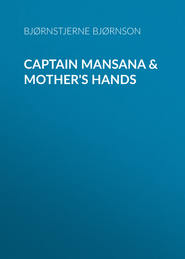По всем вопросам обращайтесь на: info@litportal.ru
(©) 2003-2024.
✖
Absalom's Hair
Настройки чтения
Размер шрифта
Высота строк
Поля
She raised her head and looked at him. She had taken off her hat and gloves, but now she put them quickly on again.
"Rafael, dear," she said, "shall we go for a walk together in the park, under the grand old trees?"
She had felt his retort to be ingenious.
After this episode, however, England, and more especially her son's schoolfellows, became distasteful to her, and she constantly made plans to keep him away from the latter out of school hours.
She found this very easy; sometimes she went over his studies with him, at others they visited all the Manufactories and "Works" for miles round.
She liked to see for herself and awakened the same taste in him.
Factories which, as a rule, were closed to visitors, were readily opened to the pretty elegant lady and her handsome boy, "who after all knew nothing at all about it;" and they were able to see almost all that they wished. It was a less congenial task to use her influence to turn his thoughts to higher things, but it was rarely, nevertheless, that she failed. She struggled hard over what she did not understand and sought for help. To explain these things to Rafael in the most attractive manner possible became a new occupation for her.
His natural disposition inclined him to such studies; but to a boy of thirteen, who was thus kept from his comrades and their sports, it soon became a nuisance.
No sooner had Fru Kaas noticed this than she took active steps. They left England and crossed to France.
The strange speech threw him back on her; no one shared him with her. They settled in Calais. A few days after their arrival she cut her hair short; she hoped that it would touch him to see that as he would not look like her, she tried to look like him—to be a. boy like him. She bought a smart new hat, she composed a jaunty costume, new from top to toe, for EVERYTHING must be altered with the hair. But when she stood before him, looking like a girl of twenty-five, merry, almost boisterous, he was simply dismayed—nay, it was some time before he could altogether comprehend what had happened. As long as he could remember his mother, her eyes had always looked forth from beneath a crown; more solemn, more beautiful.
"Mother," he said, "where are you?"
She grew pale and grave, and stammered something about its being more comfortable—about red hair not looking well when it began to lose its colour—and went into her room. There she sat with his hair before her and her own beside it; she wept.
"Mother, where are you?" She might have answered, "Rafael, where are you?"
She went about with him everywhere. In France two handsome, stylishly dressed people are always certain to be noticed, a thing which she thoroughly appreciated.
During their different expeditions she always spoke French; he begged her to talk Norse at least now and then, but all in vain.
Here, too, they visited every possible and impossible factory. Unpractical and reserved as she was on ordinary occasions, she could be full of artifice and coquetry whenever she wished to gain access to a steam bakery and particular as she generally was about her toilette, she would come away again sooty and grimy if thereby she could procure for Rafael some insight into mechanics. She shrank from foul air as from the cholera, yet inhaled sulphuric acid gas as though it had been ozone for his sake.
"Seeing for yourself, Rafael, is the substance, other methods are its shadow;" or "Seeing for yourself, Rafael, is meat and drink, the other is but literature."
He was not quite of the same opinion: he thought that Notre Dame de Paris, from which he was daily dragged away, was the richest banquet that he had yet enjoyed, while from the factory of Mayel et fils there issued the most deadly odours.
His reading—she had encouraged him in it for the sake of the language and had herself helped him; now she was jealous of it and could not be persuaded to get him new books; but he got them nevertheless.
They had been in Calais for several months; he had masters and was beginning to feel himself at home, when there arrived at the pension a widow from one of the colonies, accompanied by her daughter, a girl of thirteen.
The new comers had not appeared at meals for more than two days before the young gentleman began to pay his court to the young lady. From the first moment it was a plain case. Very soon every one in the pension was highly amused to notice how fluent his French was becoming; his choice of words at times was even elegant! The girl taught him it without a trace of grammar, by charm, sprightliness, a little nonsense; a pair of confiding eyes and a youthful voice were sufficient. It was from her that he got, by stealth, one novel after another. By stealth it had to be; by stealth Lucie had procured them; by stealth she gave them to him; by stealth they were read; by stealth she took them back again. This reading made him a little absent-minded, but otherwise nothing betrayed his flights into literature: to be sure, they were not very wonderful.
Fru Kaas noticed her son's flirtation, and smiled with the rest over his progress in French. She had less objection to this friendship, in which, to a great extent, she shared, than to those in England, from which she had been quite excluded. In the evenings she would take the mother and daughter out for short excursions; and these she greatly enjoyed. But the novel reading which the young people carried on secretly had resulted in conversations of a "grown up" type. They talked of love with the deep experience which is proper to their age, they talked with still greater discretion as to when their wedding should take place; on this point they indirectly said much which caused them many a delightful tremor. As they were accustomed to talk about themselves before others, to describe their feelings in a veiled form, it often happened when there were many people near that they carried this amusement further, and before they were themselves aware of it, they were in the full tide of a symbolic language and played "catch" with each other.
Fru Kaas noticed one evening that the word "rose" was drawn out to a greater length than it was possible for any rose to attain to; at the same time she saw the languishing look in their eyes, and broke in with the question, "What do you mean about the rose, child?"
If any one had peeped behind a rose-bush and caught them kissing one another, a thing they had never done, they could not have blushed more.
The next day Fru Kaas found new rooms, a long way from the quay near which they were living.
Rafael had suffered greatly at being torn away from England just as he had come down from his high horse and had put himself on a par with his companions, but not the least notice was taken of his trouble; it had only annoyed his mother.
To be absolutely debarred from the books he was so fond of had been hard; but up to this time, being in a foreign land, amid foreign speech, he had always fallen back upon her. Now he openly defied her. He went straight off to the hotel and sought out Madame Mery and her daughter as though nothing had occurred. This he did every day when he had finished his lessons. Lucie had now become his sole romance; he gave all his leisure time to her, and not only that (for it no longer sufficed to see her at her mother's), they met on the quay! At times a maid-servant walked with them for appearance sake, at others she kept in the background. Sometimes they would go on board a Norwegian ship, sometimes they wandered about or strolled beneath some great trees. When he saw her in her short frock come out of the door, saw her quick movements, and her lively signals to him with parasol or hat or flowers, the quay, the ships, the bales, the barrels, the air, the noise, the crowd, all seemed to play and sing,
"Enfant! si j'etais roi je donerais l'empire,
Et mon char, et mon septre, et mon peuple a genoux,"
and he ran to meet her.
He never dared to do more than to take both her chubby brown hands, nor to say more than "You are very sweet, you are very very good." And she never went further than to look at him, walk with him, laugh with him, and say to him, "You are not like the others." What experiences there had been in the life of this girl of thirteen goodness alone knows. He never asked her, he was too sure of her.
He learned French from her as one bird feeds from another's bill, or as one who looks at his image in a fountain, as he drinks from it.
One day, as mother and son were at breakfast, she glanced quietly across at him. "I heard of an excellent preparatory school of mechanics at Rouen," she said, "so I wrote to inquire about it, and here is the answer. I approve of it in all respects, as you will do when you read it. I think that we shall go to Rouen; what do you say to it?"
He grew first red, then white; then put down his bread, his table napkin; got up and left the room. Later in the day she asked him whether he would not read the letter; he left her without answering. At last, just as he was going to meet Lucie on the quay, she said, and this time with determination, that they were to leave in the course of an hour. She had already packed up; as they stood there the man came to fetch the luggage. At that moment he felt that he could thoroughly understand why his father had beaten her.
As they sat in the carriage which took them to the station he suffered keenly. It could not nave been worse, he thought, if his mother had stabbed him with a knife. He did not sit beside her in the railway carriage.











